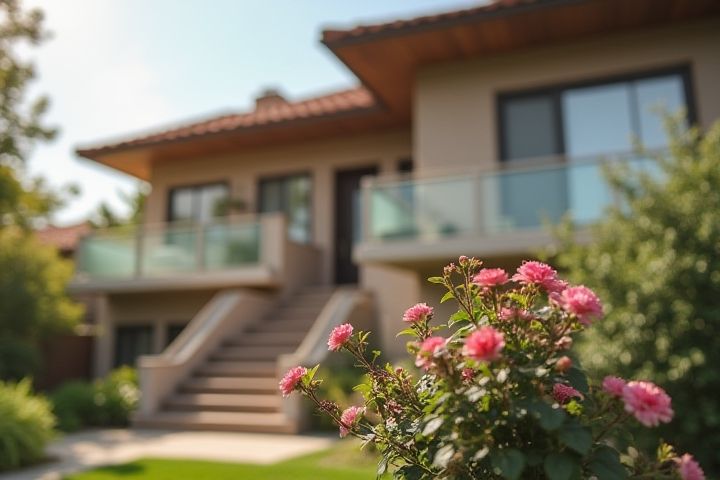
Several key factors influence house resale value, with location being paramount; properties in desirable neighborhoods, near schools, parks, and shopping centers tend to fetch higher prices. The condition of the home plays a significant role; well-maintained properties with modern upgrades, such as energy-efficient appliances and contemporary finishes, attract more buyers. Curb appeal, which includes landscaping and exterior appearance, also affects first impressions and can significantly elevate your home's marketability. Local real estate market trends should not be overlooked, as supply and demand dynamics can cause fluctuations in property values. Lastly, economic factors, including interest rates and employment rates, can impact your home's resale potential by affecting buyers' purchasing power.
What Impacts House Resale Value
Location
Location significantly influences house resale value, accounting for approximately 80% of property worth in many markets. Homes situated in desirable neighborhoods with access to quality schools, low crime rates, and convenient amenities like shopping and public transportation can see resale values increase by 20-30%. Proximity to parks, downtown areas, and waterfronts often attracts buyers, enhancing your property's appeal and marketability. In contrast, properties in less desirable locations may experience stagnated growth or declines in value, emphasizing the critical role of location in real estate investments.
Market trends
Market trends play a crucial role in determining house resale value, with supply and demand dynamics being key factors. For instance, a market with high demand and limited inventory can increase home prices substantially, often by 10-20% annually. Additionally, neighborhood development projects, such as new schools or parks, can enhance property values by as much as 15% over a few years. Monitoring these trends allows you to make informed decisions about when to sell and maximize your investment return.
Property condition
Property condition significantly influences house resale value, as buyers often prioritize well-maintained homes. A well-kept exterior, including the roof, siding, and landscaping, can enhance curb appeal and attract potential buyers, often resulting in a price increase of 5-10%. Inside, modern upgrades in kitchens and bathrooms can yield a return on investment between 60-80%, making these areas critical in the resale market. Regular maintenance, such as plumbing and electrical updates, ensures safety and functionality, directly affecting your home's market value.
Curb appeal
Curb appeal significantly impacts your house resale value, as first impressions influence buyer interest. An attractive exterior can boost property value by up to 10% or more, drawing potential buyers to explore further. Elements like fresh paint, well-maintained landscaping, and clean walkways enhance the visual appeal, creating a welcoming entrance. Investing around $400 on landscaping improvements can yield a return of over 200%, making it a crucial factor for maximizing your home's marketability.
Neighborhood amenities
Neighborhood amenities significantly influence house resale value by providing essential lifestyle benefits that attract potential buyers. Features such as parks, community centers, schools, shopping areas, and public transportation contribute to overall desirability, enhancing the appeal of a home. Access to quality schools often elevates property values, as families prioritize educational opportunities for their children. Furthermore, well-maintained recreational facilities and vibrant local businesses foster a sense of community, making your home more attractive in a competitive market.
School district quality
The quality of the school district significantly influences home resale value, often serving as a primary deciding factor for potential buyers. Homes located within top-performing school districts can command up to 20% more in resale prices compared to those in lower-rated districts. Families with children prioritize access to quality education, which makes these properties more desirable, especially in neighborhoods with highly-rated public schools. As a result, investing in homes near reputable school districts not only enhances your immediate living experience but also offers substantial long-term financial benefits.
Home size and layout
Home size significantly influences resale value, with larger homes typically commanding higher prices due to increased living space and amenities. A well-thought-out layout enhances functionality, making the property more appealing to potential buyers; open floor plans often attract families seeking spacious and interconnected living areas. Conversely, homes with awkward layouts or inadequate room sizes may deter buyers, negatively impacting market demand. You should consider how layout and size meet lifestyle needs, as this alignment can enhance your property's resale potential.
Renovations and upgrades
Renovations and upgrades significantly enhance house resale value by appealing to potential buyers' desires for modern amenities and aesthetics. Key upgrades include kitchens and bathrooms, where high-quality finishes and energy-efficient appliances often yield the highest return on investment. Curb appeal improvements, such as landscaping and exterior painting, also play a critical role in first impressions. Furthermore, investing in smart home technology can set your property apart in a competitive market, attracting tech-savvy buyers looking for convenience and efficiency.
Local economy
The local economy significantly influences house resale value, with data revealing that regions with robust job markets and low unemployment rates observe an average increase of 10-15% in property values. Demand for housing typically rises in areas with expanding businesses and favorable economic conditions, attracting potential buyers seeking stability. Additionally, access to amenities, such as quality schools and healthcare, can elevate property desirability, further enhancing resale potential. Understanding these economic indicators can help you make informed investment decisions, ensuring your property retains or grows its value in a competitive market.
Crime rates
Crime rates significantly influence house resale values, with neighborhoods experiencing higher crime often seeing property values decrease by as much as 10-20%. When evaluating a home, potential buyers typically consider local safety statistics, frequently using crime maps and reports to assess risk. Homes located in areas with low crime rates can command premium prices, reflecting increased demand for safer living environments. As you invest in real estate, understanding the correlation between crime rates and property values can guide informed decisions for maximizing resale potential.
